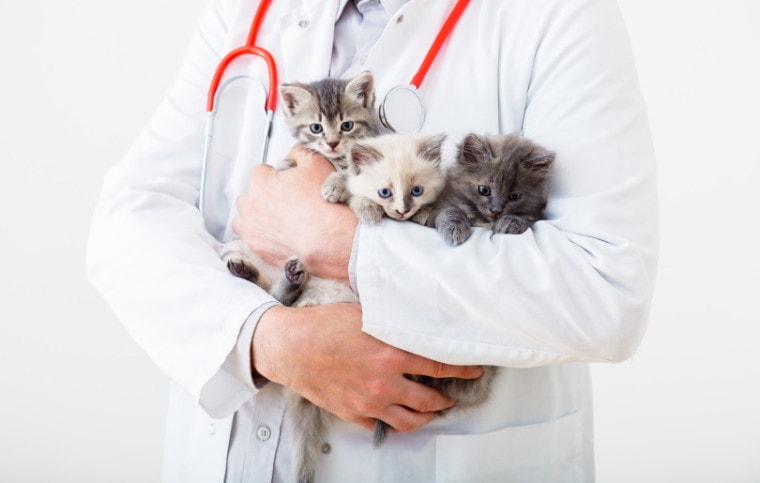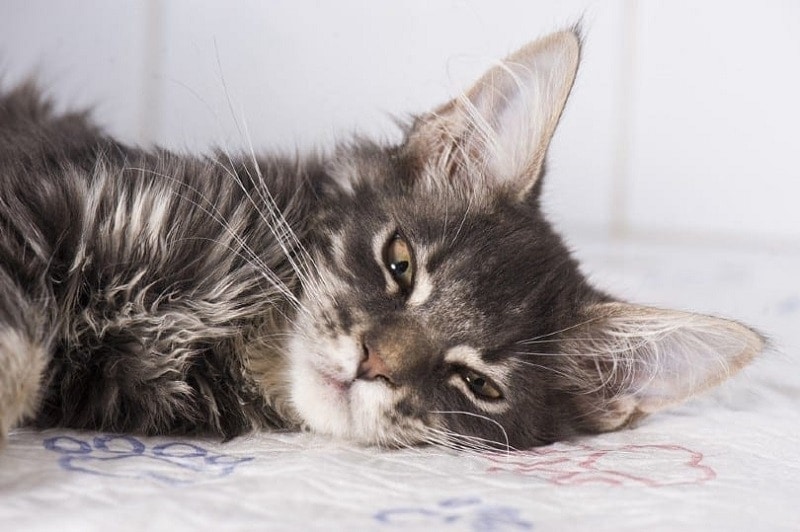
Imagine you’ve just picked out your new kitten and brought home your lovable playmate; it’s a thrilling time! Along with the excitement, comes the sudden realization that now you’re responsible for the health of another living being and there could be many potential health issues that could threaten your playful little ball of fluff.
In this article, we’ll discuss some of the signs to be on the lookout for as well as some kitten health issues and diseases that may be causing some of these signs. So, let’s get started!
The 9 Common Health Issues in Kittens
1. Eye Issues
Eye issues may vary but include discharge, swelling, squinting, and inflammation of or around the eye. In young kittens, this may be commonly coupled with nasal symptoms. Together or apart, eye and nose symptoms in kittens are seen very commonly as part of an upper respiratory tract infection (URI). Within this catch-all phrase, there are actually various specific viruses; feline herpesvirus and calicivirus are two of the more frequent ones. Because kittens lack a robust immune system coupled with the fact that these viruses spread very easily, it’s no wonder they are so common! Furthermore, recovered cats can shed the virus into the environment and the disease may resurface later in the cat’s life. Treatment is symptomatic and supportive care while there may be antibiotics for a secondary bacterial infection.
Another possible cause of eye symptoms in a kitten could include an eye ulcer, which can sometimes be associated with the herpes virus, but could also be due to an injury such as getting scratched by another cat.

2. Nasal Issues
Nasal issues could include nasal discharge, repeated sneezing, or pawing repeatedly at the nose. As mentioned above, in kittens, nasal discharge is most often accompanied by eye discharge in the very common upper respiratory infection. Other potential causes that are not as common could include a nasal polyp, a fungal infection, allergies, or a foreign object that has been inhaled into the nasal cavity.
3. Scratching
While licking and grooming in our feline friends is a common occurrence and part of everyday kitty life, if a kitten is scratching or gnawing on their body repeatedly or drawing blood, this is not normal. Often, in these young ones, the first thing to think about is external parasites as these can often easily spread from another affected animal or be present in the environment and hitch a ride on your pet.
If the location of interest is the ears, coupled with thick, dark ear exudate, ear mites are a prime suspect. Medicated ear drops will be helpful for treatment if this is diagnosed. If there is itching on the body, fleas, lice, or other external parasites may also be present. An infestation of fleas can be even more serious for a kitten, as their small body size means they can become anemic quickly from fleas feeding on their limited amount of blood.
Your veterinarian can help you find a safe treatment to resolve the issue depending on various factors such as the external parasite present as well as the age of your kitten. They will likely also want to discuss if any other pets are present as well as how to best treat the environment to prevent reinfection.
4. Not Eating or Drinking
If a small kitten is not eating well for a little while, it’s easy for them to get low blood sugar (hypoglycemia); if they are not getting enough to drink, dehydration also can set in quickly. Both of these events can quickly cause a kitten’s health to spiral downward. While not very specific, these signs can point towards something as simple as being stressed because of a new environment all the way to systemic illness and anywhere in between. Usually, if they don’t feel good or are stressed, they don’t want to eat (or drink).
Feline infectious peritonitis (FIP) is just one example of one of many cat diseases that could cause poor appetite, weight loss, or overall poor growth in kittens in combination with a fluctuating fever and lethargy. Another disease process in young kittens known as “fading kitten syndrome” (also referred to as “failure to thrive”) is where kittens from birth up to around 8 weeks of age either don’t continue to grow or decline in size/weight over the course of a few days. While FIP and fading kitten syndrome are just two less common examples, the truth is, if your cat is not eating or drinking, it’s important to have them checked.

5. Distended Abdomen
A distended abdomen (or belly) in kittens is something that is commonly seen when intestinal parasites are present. Often, weight loss and/or diarrhea may also be occurring, but that is not always the case. Roundworms and hookworms are very prevalent, but tapeworms, coccidia, and giardia are also additional parasites that could be present. Depending on the parasite, some can be spread from mother to kitten, and many are often spread via the fecal route or from the environment.
Different lab tests such as a fecal exam to look at a sample for organism eggs under the microscope or snap tests can be utilized to diagnose. If present, dewormer or medication to treat the specific parasite will be recommended. In addition, your veterinarian will likely wish to discuss important factors such as how to prevent reinfection, if the organism is zoonotic (spread from animals to people or vice versa), and any other care that may need to be provided.
Other potential causes of a distended abdomen could include constipation or even a foreign body (eating something they’re not supposed to which becomes stuck within the digestive tract). If constipation or a foreign body is the problem, vomiting and lethargy may also be present.
6. Lethargy
In a kitten, lethargy or extreme and lingering tiredness that continues despite resting, would not be considered normal. Lethargy accompanies an innumerable number of illnesses and is not a specific sign to help pinpoint a specific diagnosis. Further investigation will likely need to take place to help pinpoint what may be going on.
This sign may also be seen alongside other systemic illness signs such as fever, vomiting, and/or diarrhea. Lethargy can also be seen with anemia, which is a low red blood cell count which could be due to something like a flea infestation.
7. Vomiting
Vomiting in kittens is also a nonspecific sign that could be due to several causes. Recurrent vomiting could suggest systemic illness, a toxin, or even a foreign body.
One disease that has vomiting as a hallmark sign, but is rarer today, is called feline panleukopenia (also referred to as feline distemper). This illness affects the gastrointestinal tract and bone marrow which results in signs like vomiting, diarrhea, and bone marrow suppression. In addition, fever, not wanting to eat, as well as other signs may be present. Younger kittens typically will be more severely affected than adult cats. It can be spread from a mother to her kittens in utero or is also spread very easily in the environment or from cat to cat. The best prevention is vaccination.

8. Diarrhea
Diarrhea in a new kitten could prove to be due to something such as stress colitis, too-fast changes in food, or as discussed previously, intestinal parasites. In addition, there are many diseases that can cause loose or watery stool. Regardless of the cause, it can also lead to dehydration if it continues over time. Therefore, if one sees diarrhea in their kitten for more than a bout or two, it should be explored as to why.
9. Fever
If coupled with other signs like not eating or lethargy, fever may signify that some type of infection is present. While a fever is not a specific enough sign by itself to diagnose specific diseases, it typically warrants an investigation to try and find the source which could range from a mild upper respiratory infection all the way to feline immunodeficiency virus (FIV) or feline leukemia virus (FeLV) and anything in between.
Both FIV and FeLV are fairly common infectious diseases that subsequently allow for immune deficiency and can also result in the afflicted cat being susceptible to other illnesses. FIV is spread most commonly from other affected cat bites while FeLV is spread via bite, close contact (from saliva, milk, urine, or feces), or across the placenta from an affected mother to her kittens. Both these diseases can be tested for in kittens.
Conclusion
Having a kitten and being in charge of their overall health and well-being is a serious undertaking! If your kitten displays signs of illness, not only is it difficult for them (and you), but there could be many potential causes. For that reason, if your little feline friend is exhibiting one of the signs above, it’s important to involve your cat’s medical healthcare team and get to the root of the issue promptly.
Featured Image Credit: beton studio, Shutterstock








